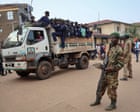
In a world often divided by conflict and disagreement, recent developments offer a glimmer of hope in the pursuit of peace and justice. Recent diplomatic engagements have set the stage for potentially transformative outcomes in regions fraught with long-standing challenges. Notably, the signing of a peace accord between Rwanda and the Democratic Republic of the Congo (DRC), coupled with efforts to secure the release of British-Egyptian dissident Alaa Abd el-Fattah, marks promising progress.
The tranquil ambiance of Washington, D.C., recently played host to a historic agreement between Rwanda and the DRC. With the supportive presence of U.S. Secretary of State Marco Rubio, the foreign ministers of these two nations endorsed a peace deal designed to alleviate the enduring conflicts in the eastern DRC. The signing ceremony highlighted the cooperative spirit underpinning this initiative, with U.S. President Donald Trump expressing satisfaction over the successful negotiations, which included discussions on lucrative mineral rights.
This peace agreement builds upon an earlier accord from 2024, which pledged the withdrawal of Rwandan troops from DRC territory within a stipulated timeframe of 90 days. The focus remains steadfast on respecting the territorial integrity of the DRC, particularly in the wake of recent incursions by armed group AFC-M23. The accord holds the promise of a new dawn for residents plagued by years of instability and conflict.
Meanwhile, across the globe, diplomatic endeavors continue to nurture hope for human rights and justice. In the United Kingdom, the case of Alaa Abd el-Fattah, a British-Egyptian dissident imprisoned in Cairo, has caught the attention of the international community. His family’s cautious optimism came to light as UK opposition leader Keir Starmer engaged in a pivotal phone conversation with Egyptian President Abdel Fatah al-Sisi.
The dialogue between Starmer and al-Sisi, aimed at strengthening UK-Egypt trade relations, also ventured into the realm of human rights advocacy, with a clear focus on Abd el-Fattah’s plight. This phone call coincided with a significant personal decision by Abd el-Fattah’s mother, Laila Soueif, who has endured a prolonged hunger strike for over 270 days. Soueif, a symbol of resilience, has chosen to alter her protest by accepting a glucose drip for sustenance, as she places trust in diplomacy to achieve her son’s improved prison conditions or his eventual release.
Such efforts embody a broader narrative of constructive engagement and cooperation, emphasizing the potential for diplomatic channels to yield peaceful outcomes amid complex global issues. Whether addressing regional conflicts or advocating for individual human rights, these stories affirm a commitment to dialogue and peace-building.
Though challenges remain, these initiatives instill a sense of hope that through international cooperation and persistent advocacy, positive change can be realized. The Rwanda-DRC peace agreement and the renewed efforts to secure Alaa Abd el-Fattah’s freedom highlight how diplomatic perseverance and targeted action can contribute to a more harmonious global community.
As these stories unfold, the world watches closely, buoyed by the promise of peaceful resolutions and a future where justice and cooperation prevail. With continued focus and mindful engagement, it is possible that such endeavors will pave the way for lasting peace and the affirmation of human rights worldwide.
Source: {link}
